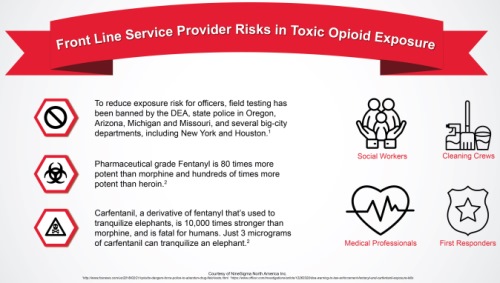Ohio Opioid Technology Challenge Addresses Front Line Service Provider Risks in Toxic Opioid Exposure
Research shows the growing risk of toxic opioid exposure for first responders, police, rescue crews and medical professionals as the opioid epidemic rages across the U.S. First responders arriving at the scene of a suspected drug overdose, law enforcement officers searching an area for illicit drugs, or medical professionals performing overdose reversal treatment, are often in danger of being exposed to toxic substances such as heroin, fentanyl, carfentanil or other synthetic and non-synthetic opioids.

That's a critical problem as the opioid epidemic grows nationwide and with opioids now responsible for 1 in 5 deaths of young adults. Often these first responders have no way of quickly identifying the presence of dangerous substances, or any means to quickly and effectively protect themselves and others. Fentanyl and other potent synthetic opioids can be absorbed through the skin or inadvertently inhaled in situations where drugs are disturbed and particles become airborne.
These exposures place first responders at serious risk. In fact, the risk is so high that the Drug Enforcement Administration (DEA), state police in Oregon, Arizona, Michigan and Missouri, and several big city departments have banned field testing to try to reduce exposure risk for their officers.
With this in mind, the Ohio Opioid Technology Challenge was launched, a three-phase, prize-based competition to find technology-based solutions that address or improve opioid abuse prevention, treatment, and overdose avoidance and response. The second phase of the challenge, ongoing now, consists of four challenge topics that address specific unmet needs – one of those topics seeks the development of technologies to protect first responders and medical professionals from inadvertent exposure to toxic opioid levels. Solutions could be those that assess a scene or patient to determine whether there is risk of exposure to toxic substances or act to protect themselves and others. These solutions could include ambient detection of opioid residue, medical prophylactics, or protective equipment, for example.
Technology developers are invited to come forward and submit their solutions by July 11, 2018, to help uncover, promote, and support the development and deployment of these promising technologies. Up to 12 prize recipients will be announced in September 2018 and will receive $200,000 to advance their solutions. These semi-finalists will be eligible to compete in the final phase of the program, the Product Phase, to further develop their technology for market entry, and possibly win an additional $1 million prize.
We hope this Challenge will help in protecting our first responders and medical professionals from inadvertent exposure to toxic opioid levels, and ultimately, in fighting this national opioid epidemic.
Frank Tropper is Director of Global Programs for NineSigma.
Posted on Jun 11, 2018